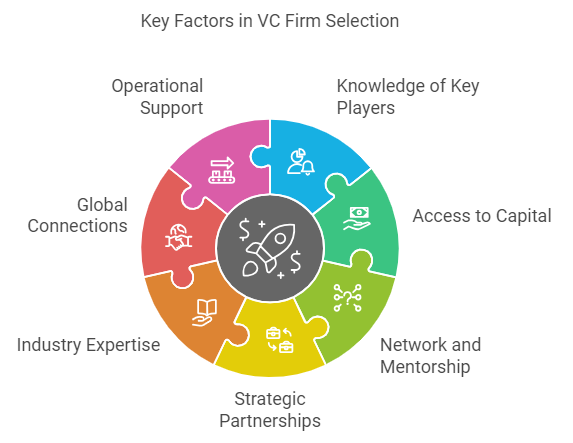Understanding venture capital firms and how they influence startups is essential for any entrepreneur looking to scale their business. For many Philippine businesses, getting venture capital funding can be the game-changing factor that pushes them to the next level and also assists them in addressing core challenges such as customer acquisition, product development, and scaling operations.
In this blog, we will explore venture capital firms' intricate operations and highlight the Philippines' top players. We will also examine the crucial differences between venture capital firms and other investors and essential factors to consider when selecting a firm for funding.
Preparing to approach a venture capital firm can be daunting, but this guide will equip you with key strategies to make the process smoother. So, without any more delays, let's get down to it.

What Are Venture Capital Firms, And What Are Their Key Characteristics

Venture capital firms are investment companies that fund early-stage, high-potential startups and businesses in exchange for equity or ownership stakes. These firms pool money from various investors to create a fund that is then invested in promising ventures, particularly in the technology, healthcare, and innovative sectors.
Venture capital firms' primary goal is to generate significant returns by helping startups grow and eventually exit through mergers, acquisitions, or public offerings.
Critical Characteristics of Venture Capital Firms
1. Equity-Based Investment
Venture capital firms invest in startups in exchange for equity or ownership shares in the company. This means they take on a risk in the hope that the business will grow and increase in value over time.
2. Focus on High-Growth Potential
Venture capital firms typically seek out companies with the potential for rapid growth and high returns. They are particularly interested in innovative startups with scalable business models that can disrupt existing markets.
3. Active Involvement
Beyond providing capital, venture capital firms often take an active role in the companies they invest in. This can include offering strategic guidance, mentoring, and access to their network of contacts to help the startup succeed.
4. High Risk, High Reward
Venture capital firms' investments are high-risk because they are often made in early-stage companies that may still need to be profitable. However, the potential rewards can be substantial if the company succeeds.
5. Long-Term Investment Horizon
Venture capital investments are typically made with a long-term perspective. The startup may take several years to mature and generate returns through an exit strategy.
6. Multiple Funding Rounds
Startups often receive venture capital through multiple funding rounds, each providing additional capital as the company achieves vital milestones and scales its operations.
7. Sector Specialization
Many venture capital firms specialize in specific sectors, such as technology, healthcare, or renewable energy, allowing them to bring specialized expertise and resources to the startups they invest in.
8. Portfolio Diversification
Venture capital firms typically diversify their investments across a portfolio of companies to eliminate potential risks. This strategy helps balance the likely losses from unsuccessful startups with the gains from successful ones.
Also Read: Top Banks for Small Business Startup Loans in 2024
How Do Venture Capital Firms Help Philippine Businesses
Venture capital firms play a pivotal role in the growth and development of Philippine businesses, particularly startups and small enterprises with high growth potential.
They provide financial investment, strategic guidance, mentorship, and access to a vast network of resources to assist local entrepreneurs in scaling their operations, innovating, and competing globally.
These firms help bridge the gap between a great business idea and a successful, sustainable enterprise, fostering innovation and contributing to the overall economic development of the Philippines.
Here, explore the key points about how venture capital firms support and drive the success of Philippine businesses -
1. Customer Acquisition
One critical area where venture capital firms lend their expertise is customer acquisition. They don't just provide funding; they offer resources and strategies for effective marketing and sales. By aligning business efforts with market demands, they help companies expand their customer base.
2. Product Development
Innovation is the lifeblood of any successful business, and product development is often one of the most costly and risky endeavors a company can undertake. In such cases, venture capital firms eliminate these risks by providing the necessary funding for research and development.
However, their role extends beyond just writing checks because they also bring in experts to refine and make the product more market-competitive. This kind of support is invaluable, especially for startups needing more experience or the internal resources to bring a world-class product to life.
3. Scaling Operations
Another significant way venture capital firms support businesses is by helping them scale their operations. Scaling isn't just about growing larger; it's about becoming more competent. Venture capital firms provide the capital needed for infrastructure expansion, hiring new talent, and implementing efficient processes.
Beyond capital, they offer expertise and guidance on managing growth. With their help, businesses can streamline operations, increasing efficiency and profitability.
4. Networking and Mentorship
Connections and knowledge can be game-changers for a business, and venture capital firms are rich in both. These firms offer access to experienced professionals and industry experts through networking and mentorship, thereby opening doors to strategic partnerships that might otherwise be out of reach.
5. Strategic Partnerships
Forming strategic partnerships can be pivotal for growth, and venture capital firms often enable these collaborations. They enable growth-driving networks by connecting businesses with complementary companies or potential clients, and these partnerships usually lead to more efficient operations, increased market reach, and significant industry influence.
6. Market Research and Regulatory Guidance
Understanding the market is crucial for Philippine businesses, and venture capital firms frequently provide access to in-depth market research and analysis. Doing so helps businesses better understand their target audience, identify market trends, and develop strategies to stay competitive.
Additionally, navigating the regulatory landscape can be complex, particularly in a dynamic market like the Philippines. In such cases, venture capital firms offer expertise in regulatory compliance, helping businesses avoid potential legal pitfalls and ensuring they operate within the bounds of the law.
7. Risk Management
Risk is inherent in any business, but venture capital firms help companies to manage it more effectively. They do this by providing risk management expertise, assisting companies in identifying potential risks, and developing strategies to eliminate them.
These risk management activities can range from financial risks to operational and strategic threats, ensuring the business is prepared for various scenarios.
8. Exit Strategies
Thinking about the end game is as important as planning for growth, and venture capital firms often assist in developing exit strategies, such as preparing for an IPO or setting the stage for mergers and acquisitions.
These strategies are vital for maximizing returns on investment and ensuring the business can continue to thrive even after the initial investors have exited.
Need help determining what venture capital firms look for in businesses before investing? Check out this video. It covers venture capital trends for 2024 and features a panel discussion on where top investors are placing their bets, providing a comprehensive overview of their current investment strategies.
Also Read: Improving Efficiency in Finance Business Processes
Top 5 Venture Capital Firms in the Philippines in 2024

The Philippines' startup ecosystem has seen remarkable growth in recent years, driven in part by the rise of venture capital firms that are actively investing in innovative and high-potential businesses.
These top venture capital firms play a crucial role in fueling startup expansion by providing essential funding, strategic guidance, and access to extensive networks. From early-stage investments to supporting companies through their growth phases, these VCs are helping shape the Philippine economy's future.
Here is a detailed look at the top 5 venture capital firms currently operating in the Philippines in 2024 -
1. Founders Launchpad
Founders Launchpad is a program or initiative typically associated with venture capital firms or startup incubators that aims to support early-stage entrepreneurs and startups. The program provides resources such as mentorship, funding, training, and networking opportunities to help founders build, launch, and scale their businesses.
While the specifics can vary depending on the organization running the Founders Launchpad, the core idea is to accelerate startups' growth by equipping them with the knowledge, skills, and connections they need to succeed.
This type of program is especially valuable for first-time entrepreneurs, who benefit from the structured support and guidance offered by experienced mentors and investors.
2. Kaya Founders
Kaya Founders is a venture capital firm based in the Philippines that focuses on supporting and investing in early-stage startups across Southeast Asia.
Founded by notable entrepreneurs and investors, Kaya Founders aims to nurture the next generation of innovative companies by providing capital, mentorship, strategic guidance, and access to a network of industry experts.
Kaya Founders is committed to promoting regional entrepreneurship, particularly in the technology and digital sectors. It helps startups scale by offering support in areas like product development, business strategy, and market expansion, enabling them to grow and succeed in competitive markets.
3. Foxmont Capital Partners
Foxmont Capital Partners manages the Philippine Ventures Fund, aiming to support Filipino entrepreneurs with a combination of capital, network, and guidance throughout different stages of development.
Their strategic investments and active role in the local ecosystem make them a significant player driving deal activity in the country.
4. Gentree
Gentree is a venture capital firm based in the Philippines that invests in technology-driven startups across Southeast Asia. It is affiliated with the Sy family, one of the most prominent business families in the Philippines.
It mainly targets businesses that have the potential to scale and make a significant impact in their respective industries and typically belong to the technology, consumer, and retail sectors, reflecting the Sy family's expertise and business interests.
Gentree aims to support the growth and development of promising startups by providing capital, strategic guidance, and access to a broad network of business resources.
5. Kickstart Ventures
Kickstart Ventures is a leading venture capital firm in the Philippines that invests in early-stage startups across Southeast Asia. It is a subsidiary of Globe Telecom, one of the country’s largest telecommunications companies, and was established to support the growth of the region's digital and technology startup ecosystem.
Kickstart Ventures provides funding, mentorship, strategic guidance, and access to a broad network of resources, including connections within the Ayala Corporation, Globe’s parent company. The firm invests in various sectors, including fintech, e-commerce, health tech, and enterprise software.
Also Read: 10 Strategies to Increase Your Business Cash Flow
Experience hassle-free applications and fast approvals with N90’s fast financing solutions. Apply today and get loan approvals within 24 hours! Take the next step in your Philippine SME’s journey and receive immediate funds for business needs!
Differences Between Venture Capital Firms and Angel Investors
Venture capital firms and angel investors are crucial funding sources for startups and early-stage businesses, but they differ significantly in their approach, scale, and involvement.
While both provide essential capital to help companies grow, their investment strategies, the amount of funding they offer, and the level of participation in the business vary.
Here, take a closer look at the critical differences between venture capital firms and angel investors to help Filipino entrepreneurs select the correct type of investment to match their business’s needs and growth ambitions -
1. Investment Flexibility
Angel investors often offer more flexible terms compared to venture capital firms. They might provide capital with fewer strings attached and less rigorous requirements. This flexibility can be advantageous for startups needing quick, hassle-free funding.
VC firms, on the other hand, usually have a set of specific criteria and formal investment processes. They manage funds from multiple sources and thus have strict policies to eliminate risks and ensure returns, which often translates to more rigid terms and conditions for the startups they invest in.
2. Investment Horizon
Angel investors typically have a longer investment horizon than venture capital firms. This means they are more patient and willing to support a company through various stages of its growth without the pressure for a rapid exit. Such patience can benefit startups that need more time to develop their products and market presence.
In contrast, VC firms often seek quicker returns on their investments. They usually have a shorter time frame for seeing a return, focusing on relatively rapid growth and exit strategies.
3. Risk Tolerance
VC firms generally have a lower risk tolerance than angel investors because they are accountable to their investors and must ensure consistent returns. They are methodical in their approach, conducting extensive due diligence to minimize risks.
Angel investors, however, might be more open to taking on higher risks. Often investing their own money, they may be willing to bet on unproven ideas with the potential for high returns. This higher risk tolerance allows startups to experiment and innovate more freely.
4. Industry and Geographic Focus
Venture capital firms usually invest in specific industries or sectors, like technology or healthcare. This specialization allows them to leverage deep expertise and add significant value to their portfolio companies.
Additionally, many VC firms operate on a regional or global scale, enabling them to back companies with the potential for international growth.
In contrast, angel investors often invest across a broader range of sectors. Their focus is usually more localized, investing in businesses within their immediate geographic area. This local insight can benefit startups deeply rooted in their community and require investors who understand local market dynamics.
5. Network and Connections
One significant advantage of partnering with VC firms is their extensive networks and connections within the industry. They often bring more than capital to the table, like providing strategic guidance, mentorship, access to potential clients, talent, and further funding rounds.
While angel investors also have valuable networks, their connections might not be as industry-specific or extensive as those of VC firms. Nevertheless, an engaged angel investor's support and personalized attention can be incredibly beneficial for startups in the early stages.
Also Read: Fast Business Loans for Quick Cash in 2024
Critical Factors For Philippine Businesses To Consider When Selecting a Venture Capital Firm
Selecting a venture capital firm is crucial for any startup looking to scale and succeed in the competitive business environment. Partnering with top VC firms can offer many benefits beyond financial backing for Philippine businesses.
Here are vital factors to consider when making this critical decision:

1. Knowing Top Venture Capital Investors in the Philippines
The first step in choosing the right venture capital firm is to familiarize yourself with the key players in the Philippine market. Some of the top VC firms in the Philippines have established a solid reputation for identifying and nurturing high-potential startups.
These firms are usually well-versed in the local startup ecosystem and are often the go-to partners for entrepreneurs.
2. Access to Capital
One of the most apparent benefits of partnering with a top-tier VC firm is access to necessary funding, which is essential for startups to expand their operations, innovate, and bring their ideas to market. Top VC firms have in-depth knowledge of structuring funding rounds to maximize growth potential while minimizing dilution.
3. Network and Mentorship
Beyond financial backing, these firms offer invaluable networks and mentorship. Experienced professionals within these firms can help you overcome common startup challenges and make informed decisions. This mentorship covers market strategy, product development, leadership training, and scaling operations.
4. Strategic Partnerships
Top VC firms have established relationships with businesses and organizations, which open doors to collaboration opportunities that can take your startup forward. Whether through co-development of products, joint ventures, or strategic alliances, these relationships can offer significant advantages.
5. Industry Expertise
Many top VC firms specialize in specific industries, giving them extensive knowledge that can be directly applied to help startups refine their products and services. This expertise provides insights based on real-world experience.
6. Global Connections
Another notable benefit is the global network these firms bring to the table. This can give your startup access to international markets, resources, and opportunities, which can be particularly beneficial if you're considering expanding your business beyond the Philippines.
7. Operational Support
Operationally, these firms often provide support in areas like HR, finance, and marketing. This backing can help you build a robust business foundation, ensuring long-term sustainability and success.
Also Read: Quick Cash Loans without Collateral in the Philippines
How To Approach a Venture Capital Firm For Funding in The Philippines
Securing funding from a venture capital firm in the Philippines requires a strategic approach, preparation, and understanding of what investors seek.
Here’s a step-by-step guide to help you navigate the process -
1. Research and Identify the Right VC Firms
Research venture capital firms active in the Philippines that are relevant to your industry. Look for firms with a history of investing in businesses similar to yours in sector, size, and growth stage.
2. Prepare a Strong Business Plan
Develop a compelling business plan outlining your business model, market opportunity, competitive landscape, financial projections, and growth strategy. Highlight what sets your business apart from competitors and why it has the potential for high growth.
3. Create a Pitch Deck
A well-crafted pitch deck is essential for initial meetings with venture capitalists. The deck should briefly summarize your business, market opportunity, team, financials, and how the investment will be used.
4. Leverage Your Network for Introductions
Personal introductions can significantly improve your chances of getting noticed by a VC firm. Use your existing network to connect with people who can introduce you to venture capitalists. If you need direct connections, consider attending industry events, joining entrepreneurial groups, or leveraging LinkedIn to build relationships with people in the VC community.
5. Tailor Your Approach
When contacting a VC firm, customize your pitch and approach based on the firm’s investment focus and portfolio. Highlight aspects of your business that align with the VC’s interests.
6. Schedule a Meeting and Present Your Pitch
Once you secure a meeting with a VC firm, be prepared to present your pitch in person or virtually. During the meeting, focus on your business's strengths, address potential concerns, and be ready to answer tough questions about your market, financials, and growth plans.
7. Be Transparent and Honest
Venture capitalists value transparency and honesty. Be open about your business’s strengths and challenges. Acknowledge risks and explain how you plan to mitigate them.
8. Follow Up Professionally
After the meeting, send a follow-up email thanking the VC for their time and reiterating your interest in working together. Provide any additional information they requested during the conference and keep the lines of communication open.
9. Negotiate the Terms
If a VC firm is interested in investing, you will enter negotiations to finalize the terms of the investment. This may include the amount of equity you’re offering, board representation, and other key terms.
10. Build a Long-Term Relationship
Once the investment is secured, build a collaborative relationship with the venture capital firm. Regularly update them on your business’s progress, seek their advice, and utilize their network to help your business grow.
Conclusion
The surge of activity in the Philippine venture capital scene is undeniable. The 2024 landscape will be vibrant and growing because it offers startups and early-stage companies access to critical funding, mentorship, and strategic support.
This is primarily because, despite facing many challenges, 2023 saw the highest yearly deals and increasing international investor interest than ever before, and we only see it rising with each passing year.
Moreover, in addition to providing businesses with economic support and opening new ways of economic development, it also provides businesses with funding, mentorship, and connections that are vital for startups to grow and succeed. Essentially, it supports the transformation of innovative ideas into authentic products and services that can compete both locally and globally.
So, it is fair to conclude that with the assistance of venture capital firms, Filipino entrepreneurs can not only gain the financial resources they need to grow their enterprises but will also have access to the expertise and networks of venture capital firms to scale their businesses successfully.
Frequently Asked Questions (FAQs)
1. How many venture capital firms are there in the Philippines?
As of 2024, approximately 65 venture capital firms operate in the Philippines. This number has steadily increased since then as the country's startup ecosystem grows and attracts more investment.
2. What is a venture capitalist in the Philippines?
A venture capitalist in the Philippines is an individual or firm that invests in early-stage companies. They provide capital in exchange for equity ownership, with the goal of generating a substantial return on their investment when the company exits, either through an IPO or acquisition.
Venture capitalists often offer mentorship, guidance, and industry expertise to help the companies they invest in succeed.
3. What is the difference between venture capital and venture capitalists?
Venture capital and venture capitalists are closely related but refer to slightly different concepts.
- Venture capital is an investment strategy providing funding to early-stage companies with high growth potential. It's a pool of money managed by venture capital firms.
- Venture capitalists are the individuals or organizations that manage venture capital funds. They are responsible for identifying promising startups, conducting due diligence, negotiating investment terms, and providing mentorship and support to the companies they invest in.
In essence, venture capital is the money being invested, while venture capitalists are the people who invest that money and manage the investment process.
4. What is the primary goal of a venture capitalist?
The main goal of a venture capitalist is to generate a high return on investment. They invest in early-stage companies with the expectation that these companies will grow significantly and eventually be sold or go public at a much higher valuation than their initial investment.
Venture capitalists aim to profit by capitalizing on these companies' potential growth and success.













